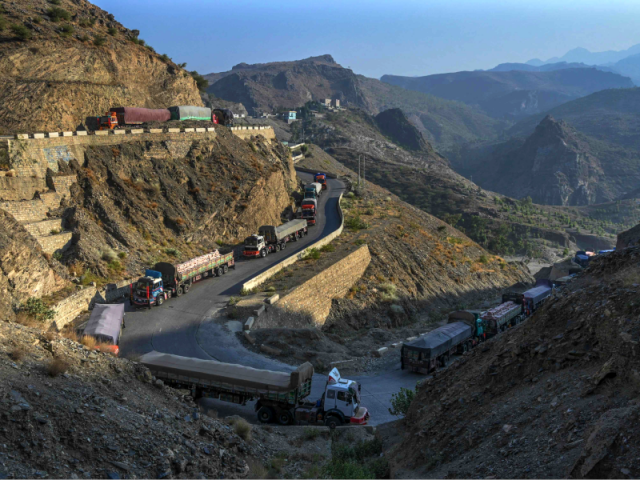Mistrust threatens to derail Pak-Afghan bonhomie
Lack of action against TTP remains sticking point

The main border crossing between Pakistan and Afghanistan reopened on Friday, following an eight-day closure. However, the underlying tensions between the neighbouring nations are far from over.
Official sources revealed to The Express Tribune on Saturday that the root cause of the ongoing tensions between Pakistan and Afghanistan is the lack of action against the banned Tehreek-e-Taliban Pakistan (TTP).
The Torkham border crossing was abruptly shut on September 6, when Pakistan and Afghan security forces exchanged fire over a dispute involving the construction of a new post along the border. Both the sides accused each other of initiating the conflict and the subsequent border closure.
While the Afghan side insisted it was repairing an old post on its side, Pakistan claimed that Afghan authorities were constructing a new post on Pakistani territory. However, beneath the surface of the border dispute lies a deeper issue: the presence of TTP sanctuaries across the border, according to officials.
The decision to reopen the border came after the intervention of the Afghan Taliban leadership. Amir Khan Muttaqi, Afghanistan's interim Foreign Minister, engaged in talks with Pakistan's diplomatic mission in Kabul.
Sirajuddin Haqqani, the interim Interior Minister and head of the Haqqani network, also reached out to Pakistan, urging the reopening of the border on humanitarian grounds.
The sources suggest that the Afghan Taliban leadership has provided assurances that the Afghan soil will not be used against Pakistan. They have also reportedly committed to persuading the TTP to withdraw from positions along the Pak-Afghan border in Chitral.
On September 6, hundreds of TTP terrorists launched an attack on two check posts in Kelash, Chitral. The ensuing exchange resulted in the deaths of at least 12 terrorists and the martyrdom of 4 Pakistani soldiers.
Subsequent encounters in Chitral between Pakistani security forces and TTP militants suggested that some militants had managed to infiltrate the Pakistani side of the border.
According to the sources, Pakistan agreed to reopen the Torkham crossing in the hope that the Afghan Taliban would live up to the promises. However, there is skepticism within Pakistan regarding the Taliban's pledges.
Similar assurances were made in the past, yet there was no tangible change on the ground. In fact, the number of TTP attacks has increased in recent months.
US Special Representative on Afghanistan Tom West recently expressed concerns over the flourishing of the TTP since the Afghan Taliban's return to power.
He emphasised that the TTP now poses a serious threat to regional security with increased attacks targeting Pakistan.
While West noted that the Afghan Taliban government has made efforts against ISIS and weakened al-Qaeda, sources suggest that their lack of action against the TTP remains a troubling issue.
"This is truly worrisome and shows that the Afghan Taliban may not be sincere in eliminating the TTP threat," remarked a source.
Pakistan is keeping all its options open, with an initial focus on seeking an amicable solution. However, in the absence of progress, other options may come into consideration.
The Afghan Taliban are aware of Pakistan's concerns, and the onus is on them to address these issues, according to sources.



















COMMENTS
Comments are moderated and generally will be posted if they are on-topic and not abusive.
For more information, please see our Comments FAQ